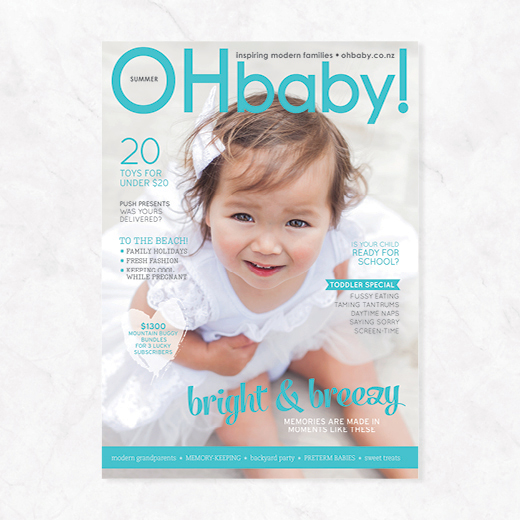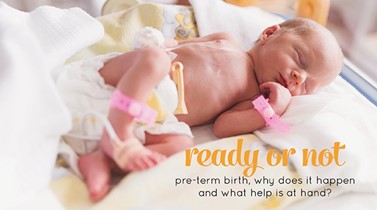7 things to think about before having another baby

The pitter-patter of tiny feet is a sweet sound to look forward to, but what else should you think about in preparation? Jade Membrey investigates.
When you begin planning a family, you will probably start thinking about what you need to do to get your ducks in a row. It can be a confusing time as you navigate your way through the maze of information available. Here we guide you through what you’re entitled to and some important considerations to ponder.
Can I afford this?
One of the greatest fears that parents-to-be face is whether they can actually afford to start a family.
Good financial planning, paying off debt and a bit of research can alleviate concerns and make way for the excitement of welcoming a baby into your life. Begin by calculating what your income and outgoings will be after baby. Once you have done this, make one budget for during maternity leave, and one for once you return to work. Keep in mind that children get more expensive as they get older, so be realistic about how well your finances will recover. Doing this will help you to understand where you stand financially and is a great starting point for mapping out what you need to do next. The BNZ Baby Calculator (babybudget.begoodwithmoney.co.nz) online helps you factor in the costs that come with a baby, even calculating annual totals.
Support is key
In New Zealand, we are fortunate to have the option of paid parental leave (PPL). This is where the government will replace a mother’s income for up to 16 weeks. The maximum amount paid is $516.85 per week before tax, but this number changes annually to reflect the average New Zealand income. In order to qualify for paid parental leave, you will have to meet certain criteria. Some companies may have their own additional policies written into their contracts, so it is best to talk to your employer before embarking on maternity leave. If you want to take longer leave than the covered period, there are unpaid leave options available – just make sure you give yourself enough time to plan and save if you choose to take unpaid leave.
If you plan on returning to work, talk to people who have done the same, taking into consideration how you might respond to working after a child. OHbaby! lifestyle expert Jessie Jarvie offers a consultancy service to guide mothers through the return to the workplace. Learn more at loulamere.com. While some people enjoy part-time work and the extra time it gives them with their children, others find full-time work better suits their family. Either way, if you return to work, you are legally required to write to your employer 21 days before your leave ends to let them know of your intentions. It is within your rights to re-negotiate the hours that you are going to work at this stage. To learn more about parental leave, visit employment.govt.nz.
Home sweet home
One of the first things that comes to mind when planning a new baby is where you're going to live. The cost of living varies in New Zealand, but regardless, up-sizing to a bigger house within your own area is going to cost more. For this reason, some parents choose to move to a different suburb in order to cut back on housing costs. Before choosing to make a move, you need to consider some other factors, such as the commute to work.
If you live in a big city, moving across town could mean missing out on connections with loved ones, or losing time and money sitting in traffic. On the other hand, if there is little distance between where you will move to and the places you regularly travel to, moving may have a positive impact on your lifestyle and finances.
Some new parents consider moving to another town or city to alleviate financial pressure, or to be closer to family. In this case, it is important to do your research first and ask a lot of questions: Can you afford to live there? Will you be able to find work? What is available in the way of post-natal support? If you are remote, will you have any friends or family nearby?
Keep in mind that you don't have to make a decision to move right away. Babies don’t require much space until they are mobile, so it’s okay to hold off the house-hunting until you really need it. In the meantime, you can adjust to family life – working within your new budget in order to get a clear idea of what you can afford and what you need. You may discover that your family is perfectly fine where you are.
Benefits and supplements
If you have assessed your budget and feel like you are going to struggle, it may be time to have a look at financial assistance.
In New Zealand, we have a package called Working for Families which provides financial help for families with at least one employed parent and a combined household income of less than $70,000 per annum (or up to $100,000 per annum in some cases). If you choose to apply for this, you will be income-assessed and advised of the maximum payment you can receive. Working for Families also works alongside Work and Income New Zealand. They offer accommodation supplements and childcare subsidies. The amount you can claim for these subsidies will depend on your income, the region you live in and the size of your family.
If you are in a situation where you and your partner will not be able to work, or if you are a sole parent, there are benefits to assist you. For more information visit workingforfamilies.govt.nz.
Insurance and protection
As you plan for your family, you will likely think about protection and security that you may not have considered before.
Home and contents insurance is a sensible option – the last thing you need with a young family is to be spending money replacing or fixing expensive belongings. If you haven’t already, begin by insuring what you own, including vehicles.
Health, life and mortgage protection insurances should be considered next - if you lost an income, would your family cope? It is wise to think about what would happen if you or your partner were unable to work. Different insurance plans can cover the cost of most medical bills, and if the household income was to be affected by a sudden illness or accident, you can receive payouts to assist with making ends meet. It is also worth considering health insurance plans for your children, as there are benefits for starting membership at birth and some companies offer family discounts.
Life insurance ensures your family is financially protected in the event of you or your partner passing away. While it is not nice to think about this possibility, creating or updating your will is another pivotal consideration. Nominating a legal guardian for your child and formally setting out what would happen to your possessions are important tasks to undertake. A family lawyer or a trustee company can assist you with creating your will.
For all insurance types, make sure you do your research and read the fine print. Every policy is unique and may have exclusions that don’t work for you. The information in this article is intended only as a guide. For personal advice on the best insurance cover for your family, talk to a broker.
What about my car?
While you're investing in all the necessary baby gear, you might consider the size of your vehicle. Your child will only need one seat, so if you already have a car with five seats and a boot, a new car is not essential. If you do choose to upgrade, however, there are some things to keep in mind.
The safety of your family is a priority, so regardless of whether you are buying an older model or a new car, it is important to ensure that it has a strong body and good safety features. Multiple air bags, ABS brakes, Electronic Stabilty Control and reversing cameras are important.
The next thing to consider is the size and comfort of the car. Babies require a lot of extra luggage and you need space for this.
Look at how much room there is in the boot and around the seats. Take the car for a test drive and check that you can manoeuvre it well and that it is easy to park.
Ensure that it is comfortable - some cars are designed to make fitting carseats and getting children in and out much easier. Consider the size of the doors, the height of the seats, the ease of using the door handles and how it feels to actually sit in the car.
Finally, it’s okay to consider how the car looks. Practical does not have to mean frumpy –it’s okay to drive in style!
A FEW THOUGHTS FOR NEW PARENTS
Although it’s easy for insurance to slide down the to-do list in preparation for a baby, it is important to make sure your family is covered. The basic question to ask yourself, when considering the need for life insurance, is are people depending on you for financial support? If the answer is yes, as it would be for most parents, then you should seriously consider life insurance.
The team AA Life suggests three key things you should do to ensure your children will be looked after the way you want them to be, in case the unimaginable happens and you’re not around to take care of them:
1. Talk to your family to let them know your wishes.
2. Make a will.
3. Take out life insurance. When considering your amount of cover, think about your family's living costs, childcare needs, the future education of your children and any debts you'll leave behind. Some people also like to make allowances to leave their children lump sum payments for major life events and even funds to cover funerals.
For more information on what is best for your family, visit aalife.co.nz.

AS FEATURED IN ISSUE 32 OF OHbaby! MAGAZINE. CHECK OUT OTHER ARTICLES IN THIS ISSUE BELOW

















